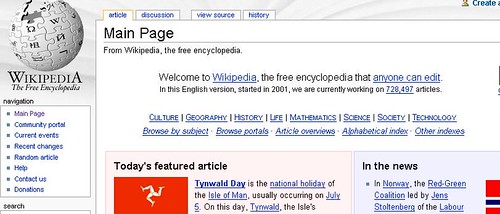
As you can see in the screenshot above, Wikipedia is a "free encylopedia that anyone can edit" - an awesome claim for those of us educated in the pre-Web era. In Wikipedia's Introduction it says:
Wikipedia is an encyclopedia written collaboratively by many of its readers. Lots of people are constantly improving Wikipedia, making thousands of changes an hour, all of which are recorded on the page history and the Recent Changes page. Nonsense and vandalism are usually removed quickly, and their creators banned.
So people from all over the world, and in many languages, can add to and edit entries in Wikipedia.I find that amazing! Instead of paying USD $1495.00 for the current Encyclopaedia Britanica, you can use Wikipedia for free.
"But what about its quality?" teachers and others ask. If it's free, and created by anyone who feels like contributing, can it possibly be accurate?
Here is a section from a longer entry describing Wikipedia's reliability:
The German computing magazine c't performed a comparison of Brockhaus Premium, Microsoft Encarta, and Wikipedia in October 2004: . Experts evaluated 66 articles in various fields. In overall score, Wikipedia was rated 3.6 out of 5 points ("B-"), Brockhaus Premium 3.3, and Microsoft Encarta 3.1.[38] (#wp-endnote_Kurzidim) In an analysis of online encyclopedias, Indiana University professors Emigh and Herring wrote that "Wikipedia improves on traditional information sources, especially for the content areas in which it is strong, such as technology and current events."[39] (#wp-endnote_EmighHerring)http://www.answers.com/topic/wikipedia
A good analogy for understanding the strengths and weaknesses of Wikipedia's approach can be seen in looking at the difference between the standards of courtroom and investigative evidence. The fact that Wikipedia can be edited by anyone makes it difficult to claim it can be trusted with the same degree of certainty as one would expect from courtroom evidence. However, its openness to broader base of contributors allows it to achieve breadth and depth of creativity and connections that make it ideal for learning about and investigating ideas, similar to the way in which the more liberal use of investigative evidence can lead to important leads and further evidence that could have been strangled by applying the rigid standards of courtroom evidence.
Notice that in the comparison, Wikipedia got 3.6 out of 5 points ("B-"), while Brockhaus Premium got 3.3, and Microsoft Encarta 3.1. Wikipedia scored higher than Encarta!
So if you want to find information on a specific topic, you can use keywords ("Single terms or short phrases that best define the main points of your topic. Keywords are used for searching catalogs and databases." http://www.lib.unc.edu/instruct/manuscripts/glossary/#k) in Google and sort through the thousands of hits, or you can go to Wikipedia and get clear specific information that is reasonably trustworthy. Check it out!
tags
Wikipedia

No comments:
Post a Comment